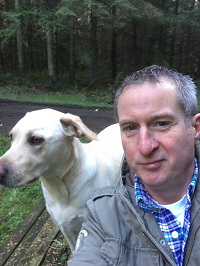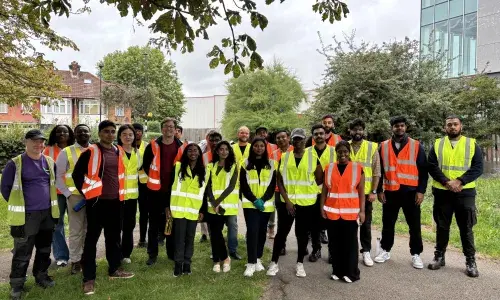
World Mental Health Day: If you’re feeling like you can’t cope, talk to someone
World Mental Health Day is a moment to reflect on the importance of protecting emotional wellbeing at work. This year’s theme is suicide prevention. Here, Richard Wright, control systems operator for Scotland, shares how pressure at work left him feeling suicidal – and how his recovery made him determined to encourage more men to open up about workplace stress.

I remember sitting in my garden crying and just wishing I could disappear. I thought everyone would be better off if I wasn’t there anymore.
When I look back, I think what about my wife, my children? What was I thinking? It’s hard to believe I felt that way just because of a bad situation at work, but I did.
It all started back in 2014. I was working as an instrument technician at a compressor station, when a pipeline supervisor job opened up. It was a big step up, covering a huge area from Edinburgh right down to Teeside in North East England. My manager said I should apply. I did and got the job.
I felt under constant pressure
I’d always wanted to be a manager, but it was tough as I had to start from scratch and build a new team, which meant for a while I was doing a lot of the work by myself. I felt unsupported and became increasingly stressed. I’m not a typical macho man but I am a doer and wanted people to have confidence in me. So instead of just talking to someone and asking for help, I carried on, keeping it all inside. I felt under constant pressure. I was working with a new manager and I was scared to approach him and felt terrified of getting anything wrong.
In the UK, men are three times as likely to take their own lives than women.
Then I lost my mam and that was when things came to a head. One day I went to write a permit at work and just couldn’t do it. I write them all the time, but it was as if a mist had descended. I just sat down in a puddle on the ground and started to cry. The guy who I was with put his arm around me and said I needed to get help. I knew he was right. I went straight to the doctor and was signed off unfit for work. It was then that National Grid stepped in and, with support from a temporary senior manager, we started to work together to help me get better.
I was signed off for around seven months and National Grid supported me at every stage, working with my medical team to make sure I got access to the right treatment. Along with medication from my doctor, I saw a psychotherapist and learned about mindfulness, meditation and CBT (Cognitive Behaviour Therapy).
Always live in the present
I find mindfulness very useful as it alters your thought process, you learn to live in the moment instead of worrying about the future or pointlessly mulling over the past. My dog Buddy really helped with my recovery. Animals always live in the present and I would go for long walks with him, watching how he behaved and learning from him, taking notice of my surroundings and how to enjoy life again. He comes with me everywhere now. Slowly I began to get better. I began to sleep well again – I had stopped sleeping altogether before – to eat properly and take care of myself.
Looking back I can see how different I was when I was suffering at work. There was a long, dark period when I thought everyone else was to blame. I’m normally a happy, jokey person, but I’d become aggressive and angry. It really hit me when I went for a walk with my daughter during my recovery, she was only 10 at the time, and she said to me: “Daddy, I’m glad you don’t do your old job anymore. You’ve changed now. You’re fun and such a nice person again.”
1 in 5 adults experience suicidal feelings at some point in their lives.
When we got home I apologised to my family. I told them that I had been trying too hard to be perfect at work. I felt I had to carry on, to keep earning to keep a roof over our heads and I had hired a whole team of new people who I didn’t want to let down. I hung on too long. I should have spoken to someone, but was too scared that people would think I was weak minded and incapable. I thought I could deal with it, but I couldn’t. If more men were able to talk about how they felt, I truly believe there would be less suicide.
I’m in a much better place
I’ve got a new manager now and she is so supportive. I know I can talk to her about anything and she will listen. I'm part of an awesome team and proud to put my National Grid shirt on every day. I love my job again and I’m grateful that I’m in a much better place.
In the UK, the highest suicide rate is for men aged 45-49.
I never want to go back to feeling the way I did, but I know it’s made me stronger. Now I help other people by talking about my experience as much as I can, so people know they’re not alone. I encourage everyone, especially men like me, not to bottle things up. If you’re having a bad day at work, take a walk, and get some perspective. Above all, if you’re feeling like you can’t cope, talk to someone – there is help available, all you have to do is ask for it.
For more information on World Mental Health Day visit the UK mental health website.
For more on improving mental health at work see mental health charity Mind’s tips and advice.
If you're concerned about your mental health speak to your doctor to get advice. The Samaritans operate a 24/7 free helpline on 116 123 or you can email [email protected]
National Grid employees can call the Health and Wellbeing helpline on 0845 094 8107 for confidential advice and support.


